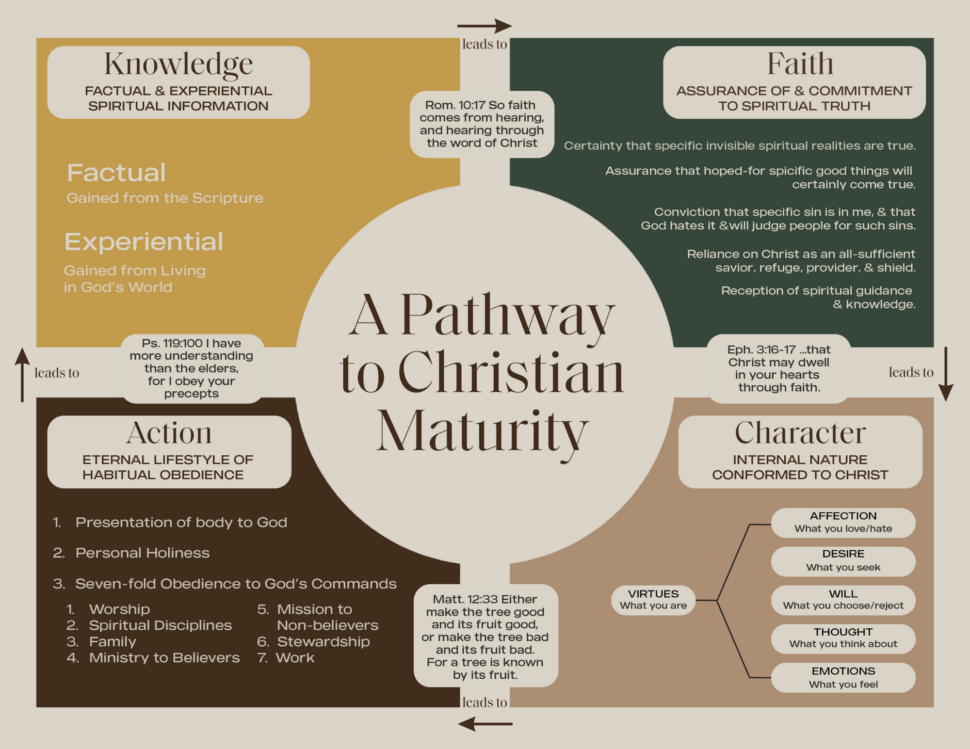
Christians will not be saved by their works but will be judged by them. God desires to see good works lived out and, by the Spirit, with full obedience to all His commands.
I. Introduction: Action
A. The final test of godliness is action… WORKS!
B. Many people go astray on this point, but the Bible is clear: we will most certainly not be saved by our works, but we will most certainly be judged by our works:
Ephesians 2:8-10 For it is by grace you have been saved, through faith– and this not from yourselves, it is the gift of God– 9 not by works, so that no one can boast. 10 For we are God’s workmanship, created in Christ Jesus to do good works, which God prepared in advance for us to do.
And I saw the dead, great and small, standing before the throne, and books were opened. Another book was opened, which is the book of life. The dead were judged according to what they had done as recorded in the books. The sea gave up the dead that were in it, and death and Hades gave up the dead that were in them, and each person was judged according to what he had done. (Revelation 20:12-13)
God “will give to each person according to what he has done.” To those who by persistence in doing good seek glory, honor and immortality, he will give eternal life. But for those who are self-seeking and who reject the truth and follow evil, there will be wrath and anger. (Romans 2:6-8)
C. God desires to see good works lived out by our bodies in space and time, fully recorded in His heavenly books. He wants us to obey Him gladly, so that His will will be done on earth as it is in heaven.
D. By the Spirit, God is continually working toward the goal of full obedience to all His commands in all His children all the time. He will work these works in us until the day we are glorified and each of these is perfected in us.
Romans 8:4 [God sent his Son to die on the cross] in order that the righteous requirements of the law might be fully met in us, who do not live according to the sinful nature but according to the Spirit.
II. Habitual Obedience
A. Habits of Holiness – The body is trained by them, by repetition, day after day, for good or for evil. Habitual obedience is the key to a godly lifestyle.
Just as you used to offer the parts of your body in slavery to impurity and to everincreasing wickedness, so now offer them in slavery to righteousness leading to holiness. (Romans 6:19)
B. The Commands of God Define Godly Actions
We know that we have come to know him if we obey his commands. The man who says, “I know him,” but does not do what he commands is a liar, and the truth is not in him. But if anyone obeys his word, God’s love is truly made complete in him. This is how we know we are in him: Whoever claims to live in him must walk as Jesus did. (1 John 2:3-6)
C. Obedience in the Book of Romans. True saving faith produces physical obedience to the command of God.
Through [Christ] we have received grace and apostleship to bring about the obedience of faith for the sake of his name among all the nations (Romans 1:5, ESV)
Romans 16:25-26 Now to him who is able to establish you by my gospel and the proclamation of Jesus Christ… so that all nations might believe and obey him
III. The Body and Its Works
A. Dualism Rejected: false teachers denied the incarnation of Christ, and sought to escape bodily lusts by rules and regulations
B. Five-fold Proof of God’s Esteem of the Body
1. At creation, God made human bodies and called them “very good”
2. God sent His Son into the world in an “incarnation”
The Word became flesh and made his dwelling among us. (John 1:14)
3. Christ was raised in a physical body, in which he will live forever
Look at my hands and my feet. It is I myself! Touch me and see; a ghost does not have flesh and bones, as you see I have. (Luke 24:39)
4. The indwelling of the Holy Spirit in the bodies of redeemed saints while they still live on earth proves that God delights in the body
Do you not know that your body is a temple of the Holy Spirit, who is in you, whom you have received from God? (1 Corinthians 6:19)
5. The human body is elevated to eternal significance by the doctrine of the general resurrection.
Multitudes who sleep in the dust of the earth will awake: some to everlasting life, others to shame and everlasting contempt. (Daniel 12:2)
Do not be amazed at this, for a time is coming when all who are in their graves will hear his voice and come out– those who have done good will rise to live, and those who have done evil will rise to be condemned. (John 5:28-29)
C. The Body: our only vehicle for earthy obedience
D. But… the Body is a Cursed Battlefield with Sin
1. Our bodies are now “bodies of sin” (Rom. 6:6). In Romans 6:12 it is called a mortal body, or a body that is constantly dying and destined to die. In Romans 7:24 it is called the body of death.
2. The idea of “body of sin” is that the body’s drives are a constant pull toward evil
Romans 7:22-23 For in my inner being I delight in God’s law; 23 but I see another law at work in the members of my body, waging war against the law of my mind and making me a prisoner of the law of sin at work within my members.
3. Other passages refer to the earthly body as an “earthly tent.” This means that the earthly body is impermanent. (2 Peter 1:13, 2 Corinthians 5:4)
4. We constantly care for the body’s needs, but we must not give in to its lusts. (Ephesians 5:28-29)
5. At the end of this struggle awaits future glory in glorious bodies
Philippians 3:21 [Christ], by the power that enables him to bring everything under his control, will transform our lowly bodies so that they will be like his glorious body
E. A Pathway of Prepared Works – He then sovereignly orchestrates daily life circumstances, acting as a matchmaker between His children and the good works He wants us to delight in and to do.
For we are his workmanship, created in Christ Jesus for good works, which God prepared beforehand, that we should walk in them. (Ephesians 2:10, ESV)
1. And these good works really make up the whole course of our daily lives.
2. A mature Christian, therefore, awakes every day knowing that God has orchestrated a series of good works that will carry him/her through the whole day
IV. The Presentation of the Body
I appeal to you therefore, brothers, by the mercies of God, to present your bodies as a living sacrifice, holy and pleasing to God, which is your spiritual worship. (Romans 12:1)
A. The Central Work of the Christian with his body: Presentation to God
Romans 6:13 Do not offer the parts of your body to sin, as instruments of wickedness, but rather offer yourselves to God, as those who have been brought from death to life; and offer the parts of your body to him as instruments of righteousness.
B. Christ Bids Us Come and Die
John 12:24-26 I tell you the truth, unless a kernel of wheat falls to the ground and dies, it remains only a single seed. But if it dies, it produces many seeds. 25 The man who loves his life will lose it, while the man who hates his life in this world will keep it for eternal life. 26 Whoever serves me must follow me; and where I am, my servant also will be. My Father will honor the one who serves me.
1. The Bible teaches that there is something of infinitely greater worth than a human life, and that is the glory of God.
2. We have seen from the gospel that the Father was willing to pour His own Son out unto death, a bloody and painful death on the cross, in order to save us from our sins.
3. We learn from Scripture that the doctrine of the resurrection means that this world is not all there is, and that death is not the end of our existence.
4. God considers our earthly lives and physical bodies as useful for his purposes, even to the point of our own deaths
As it is written, “For your sake we are being killed all the day long; we are regarded as sheep to be slaughtered.” (Romans 8:36, ESV)
C. Learning to Die Daily – This death march following Jesus is to be a “daily” shouldering of the cross (Luke 9:23), therefore, it is to be a spiritual death we must die. Paul wrote:
I want to know Christ and the power of his resurrection and the fellowship of sharing in his sufferings, becoming like him in his death, and so, somehow, to attain to the resurrection from the dead. (Philippians 3:10-11)
D. A Living Sacrifice – Nowhere in all the New Testament, however, is the theology of self-sacrifice so clearly laid forth as in the Book of Romans, and the culmination is in Romans 12:1.
E. Presented to God
1. So what, exactly, does it mean to “present” your body, holy and pleasing, to God? All of this is presented in detail in Romans 6.
2. One of the key principles Paul establishes there is that, on the basis of our spiritual union with Christ, we died to sin and can never live in it again.
Therefore do not let sin reign in your mortal body so that you obey its evil desires. Do not offer the parts of your body to sin, as instruments of wickedness, but rather offer yourselves to God, as those who have been brought from death to life; and offer the parts of your body to him as instruments of righteousness. (Romans 6:12-13)
3. Negatively, do not let sin reign in your mortal body, because sin is no longer your master. Therefore, do not offer the parts of your body to sin. Positively, offer yourself to God, and offer the parts of your body to Him. The behavior of the body is sure proof of the master who is ruling.
F. Members of the Body
1. What does Paul mean when he speaks of the “members” or our bodies? In a very literal sense, it has to do with any part of the body—our hands, arms, feet, eyes, mouth, ears, etc. But it also extends to our very selves… our hearts, souls, and minds
2. John Calvin’s personal seal:
3. Paul uses this expression metaphorically to speak of our being different “parts” of Christ’s body, the church, in Romans 12.
Just as each of us has one body with many members, and these members do not all have the same function, so in Christ we who are many form one body, and each member belongs to all the others. (Romans 12:4-5) G. Here I Am!
The essence of presentation is saying “Here I am! I am yours to command!” Again and again in the Bible, when God calls a godly man, he answers exactly like this:
Some time later God tested Abraham. He said to him, “Abraham!” “Here I am,” he replied. Then God said, “Take your son, your only son, Isaac, whom you love, and go to the region of Moriah. Sacrifice him there as a burnt offering on one of the mountains I will tell you about.” (Genesis 22:1-2)
Then he reached out his hand and took the knife to slay his son. But the angel of the LORD called out to him from heaven, “Abraham! Abraham!” “Here I am,” he replied. (Genesis 22:10-11)
• And God spoke to Israel in a vision at night and said, “Jacob! Jacob!” “Here I am,” he replied. “I am God, the God of your father,” he said. “Do not be afraid to go down to Egypt, for I will make you into a great nation there. (Genesis 46:2-3)
When the LORD saw that he had gone over to look, God called to him from within the bush, “Moses! Moses!” And Moses said, “Here I am.” (Exodus 3:4)
Isaiah 6:8 Then I heard the voice of the Lord saying, “Whom shall I send? And who will go for us?” And I said, “Here am I. Send me!”
H. The Example of Christ
1. But no godly man or prophet has ever said “Here I am, send me” with more purity and courage than Jesus Christ.
2. Psalm 40 is a powerful prediction of Christ’s obedience, quoted also in Hebrews 10:
Sacrifice and offering you did not desire, but my ears you have pierced; burnt offerings and sin offerings you did not require. Then I said, “Here I am, I have come– it is written about me in the scroll. I desire to do your will, O my God; your law is within my heart.” (Psalm 40:6-8)
3. Christ’s spirit of willingness to listen and then to offer Himself was predicted in Isaiah 50:
The Sovereign Lord … wakens me morning by morning, wakens my ear to listen like one being taught. The Sovereign Lord has opened my ears, and I have not been rebellious; I have not drawn back. I offered my back to those who beat me, my cheeks to those who pulled out my beard; I did not hide my face from mocking and spitting. (Isaiah 50:4-6)
4. This is obedience; it is how Christ saved us from sin, and it is to this same obedience that Christ now calls us.
5. So also Christ now calls all of His disciples to listen to His call morning by morning and to offer ourselves to Him, and offer the parts of our bodies to His service.
Come to me, all you who are weary and burdened, and I will give you rest. Take my yoke upon you and learn from me, for I am gentle and humble in heart, and you will find rest for your souls. For my yoke is easy and my burden is light. (Matthew 11:28-30)
6. By this new submission alone will we craft the good works that God will reward eternally.
V. Purity from Sin
Holiness is essentially separation: separation from evil and separation to God. Here we come to the fruit on the tree of character. Jesus said Make a tree good and its fruit will be good, or make a tree bad and its fruit will be bad, for a tree is recognized by its fruit. (Matthew 12:33)
Of the Ten Commandments, all but one, Honor your father and mother (Exodus 20:12) is negative, prohibiting something:
1) You shall have no other gods
2) You shall not make any idols or worship any idols
3) You shall not take the name of the Lord in vain
4) You shall not do any labor on the Sabbath
5) Honor your father and mother
6) You shall not murder
7) You shall not commit adultery
8) You shall not steal
9) You shall not bear false witness
10) You shall not covet
So also in the New Testament, holiness is taught both negatively and positively. In
Ephesians 4, Paul teaches us to be holy by putting off the old and putting on the new
Ephesians 4:22-24 You were taught, with regard to your former way of life, to put off your old self, which is being corrupted by its deceitful desires; 23 to be made new in the attitude of your minds; 24 and to put on the new self, created to be like God in true righteousness and holiness.
A. Mortification of the Deeds of the Body
Colossians 3:5-6 Put to death, therefore, whatever belongs to your earthly nature:
sexual immorality, impurity, lust, evil desires and greed, which is idolatry. 6 Because of these, the wrath of God is coming.
Colossians 3:8 But now you must rid yourselves of all such things as these: anger, rage, malice, slander, and filthy language from your lips.
1. Specifically naming sinful practices is essential to our holiness. Personal holiness, then, consists in putting them to death by the power of the Spirit.
Romans 8:13-14 For if you live according to the flesh, you will die; but if by the Spirit you put to death the misdeeds of the body, you will live, 14 because those who are led by the Spirit of God are sons of God.
2. In other words, to be a “son of God” means to follow the Spirit into daily battle against these practices
B. Purifying Ourselves as He is Pure
1. The word “pure” is a word of perfection, and is therefore only a goal. Jesus said Blessed are the pure in heart, for they will see God. (Matthew 5:8)
2. We who have had a bath through faith in Christ still need to have our feet washed.
A person who has had a bath needs only to wash his feet; his whole body is clean. And you are clean, though not every one of you. (John 13:10)
You are already clean because of the word I have spoken to you. (John 15:3)
3. But God also wants us to purify ourselves from all daily defilements
1 John 3:2-3 …when he appears, we shall be like him, for we shall see him as he is. 3 Everyone who has this hope in him purifies himself, just as he is pure.
2 Corinthians 7:1 Since we have these promises, dear friends, let us purify ourselves from everything that contaminates body and spirit, perfecting holiness out of reverence for God.
C. Four Key Arenas of Purity
1. Sexual purity – Few areas have the power to destroy with as much devastating power as sexuality.
Ephesians 5:3 But sexual immorality and any impurity or greed should not even be heard of among you, as is proper for saints.
2. Speech purity – According to James, no member of the body causes so much pain, so much anguish as the tongue, and no member is so hard to control. The reason the tongue is so difficult to control is that it is a reflection of the state of the heart.
James 3:2 We all stumble in many ways. If anyone is never at fault in what he says, he is a perfect man, able to keep his whole body in check.
Jesus said: out of the overflow of the heart the mouth speaks. (Matthew 12:34)
Various sins of the tongue: lying, cursing, filthy language, coarse joking, slander, gossip, blasphemy, false doctrine, bearing false witness, boasting, arguing, complaining, harsh words, exaggeration, half-truths, flattery…
3. Relational purity – Sin has the effect of isolating human beings from each other, especially through bitterness and unforgiveness
Ephesians 4:31-32 Get rid of all bitterness, rage and anger, brawling and slander, along with every form of malice. 32 Be kind and compassionate to one another, forgiving each other, just as in Christ God forgave you.
4. Lawful pleasure purity – At no time in the almost two thousand years of church history have Christians had so many lawful diversions from the work of the Kingdom, and (seemingly) so much time with which to enjoy them.
“Everything is permissible for me”– but not everything is beneficial. “Everything is permissible for me”– but I will not be mastered by anything. “Food for the stomach and the stomach for food”– but God will destroy them both. (1 Corinthians 6:12-13).
Honey is a metaphor for the “good things in life”:
Proverbs 24:13 Eat honey, my son, for it is good; honey from the comb is sweet to your taste.
Proverbs 25:16 If you find honey, eat just enough– too much of it, and you will vomit.
Proverbs 27:7 He who is full loathes honey, but to the hungry even what is bitter tastes sweet.
VI. Dealing Properly with Sin
Dealing properly with sin involves a vertical and horizontal aspect: vertically, the Christian must deal with God over his sin; horizontally, the Christian must deal with others that the sin has affected.
A. Confession of Sin
1. Sin must be covered, but only God can cover it effectively.
He who conceals his sins does not prosper, but whoever confesses and renounces them finds mercy. (Proverbs 28:13)
2. The Apostle John gives us the greatest encouragement to confess our sins to God when he writes:
If we confess our sins, he is faithful and just and will forgive us our sins and purify us from all unrighteousness. (1 John 1:9)
3. A mature Christian is also willing to face other people and confess sins to them as well, where needed. His pride will not stop his deep desire for holiness and reconciliation.
Confess your sins to each other and pray for each other so that you may be healed. (James 5:16)
B. Mourning and Fasting for Sin
1. One aspect of the healthy Christian’s emotional life is grieving over sin, as we’ve already mentioned in the section on emotions. This runs so contrary to our shallow, fun-loving age. We deal lightly with sin and tend to minimize it. But a mature Christian recognizes that failure to mourn over sin is a guarantee to repeat it. So a mature Christian readily obeys James’ command to mourn:
Come near to God and he will come near to you. Wash your hands, you sinners, and purify your hearts, you double-minded. Grieve, mourn and wail. Change your laughter to mourning and your joy to gloom. Humble yourselves before the Lord, and he will lift you up. (James 4:8-10)
2. Fasting is also seen to be a display of grief and mourning, for Jesus linked the two. When asked by John the Baptist’s disciples why He and His disciples didn’t fast:
Jesus answered, “How can the guests of the bridegroom mourn while he is with them? The time will come when the bridegroom will be taken from them; then they will fast. (Matthew 9:15)
C. Fruit in Keeping with Repentance
1. Having dealt with God directly over the sin, having repented and confessed, having grieved and prayed, now the Christian is zealous to produce fruit in keeping with the repentance the Holy Spirit has worked.
2. Fruit in keeping with repentance is essential to a life of saving faith. Just as James taught in James 2:26 that faith without deeds is dead, so also is repentance without its connected fruit.
D. Making Restitution
1. Our sinfulness puts us in the need of humbling ourselves and asking forgiveness of others, and seeking to make restitution for our wrongs.
2. Example of Zacchaeus. As a chief tax collector, he had become fabulously wealthy by taking excessive taxes from his countrymen, cheating them to profit himself. But when conviction and salvation came to his heart, he knew what he had to do
Zacchaeus stood up and said to the Lord, “Look, Lord! Here and now I give half of my possessions to the poor, and if I have cheated anybody out of anything, I will pay back four times the amount.” Jesus said to him, “Today salvation has come to this house, because this man, too, is a son of Abraham.” (Luke 19:8-9)
3. Genuine repentance produces many actions of humbling and of dealing painfully and properly with the effects of sin. Mature Christians do not shrink pridefully from this responsibility.
E. Eternal Vigilance
Irish philosopher John Philpot Curran … “Eternal vigilance is the price of liberty”
1. Paul put the concept this way:
Therefore let anyone who thinks that he stands take heed lest he fall. (1 Corinthians
10:12)
2. After a Christian has sinned, he/she should study what happened, how they reacted, what temptations the devil used to deceive them, and what actions led to the sin. Then the Christian should be doubly vigilant about that sin in the future, knowing that a pattern of sin can be established quickly.
Next week: Seven Categories of Christian Works
1. Worship: both public and private, formal and informal
2. Spiritual Disciplines: Bible intake, prayer, fasting, etc.
3. Family: marriage, parenting
4. Ministry to Believers: spiritual gifts, and “one anothering”
5. Mission to Non-believers: evangelism, missions, mercy ministries
6. Stewardship: time, energy, and money
7. Work: employment, maintaining possessions (not being a sluggard)










